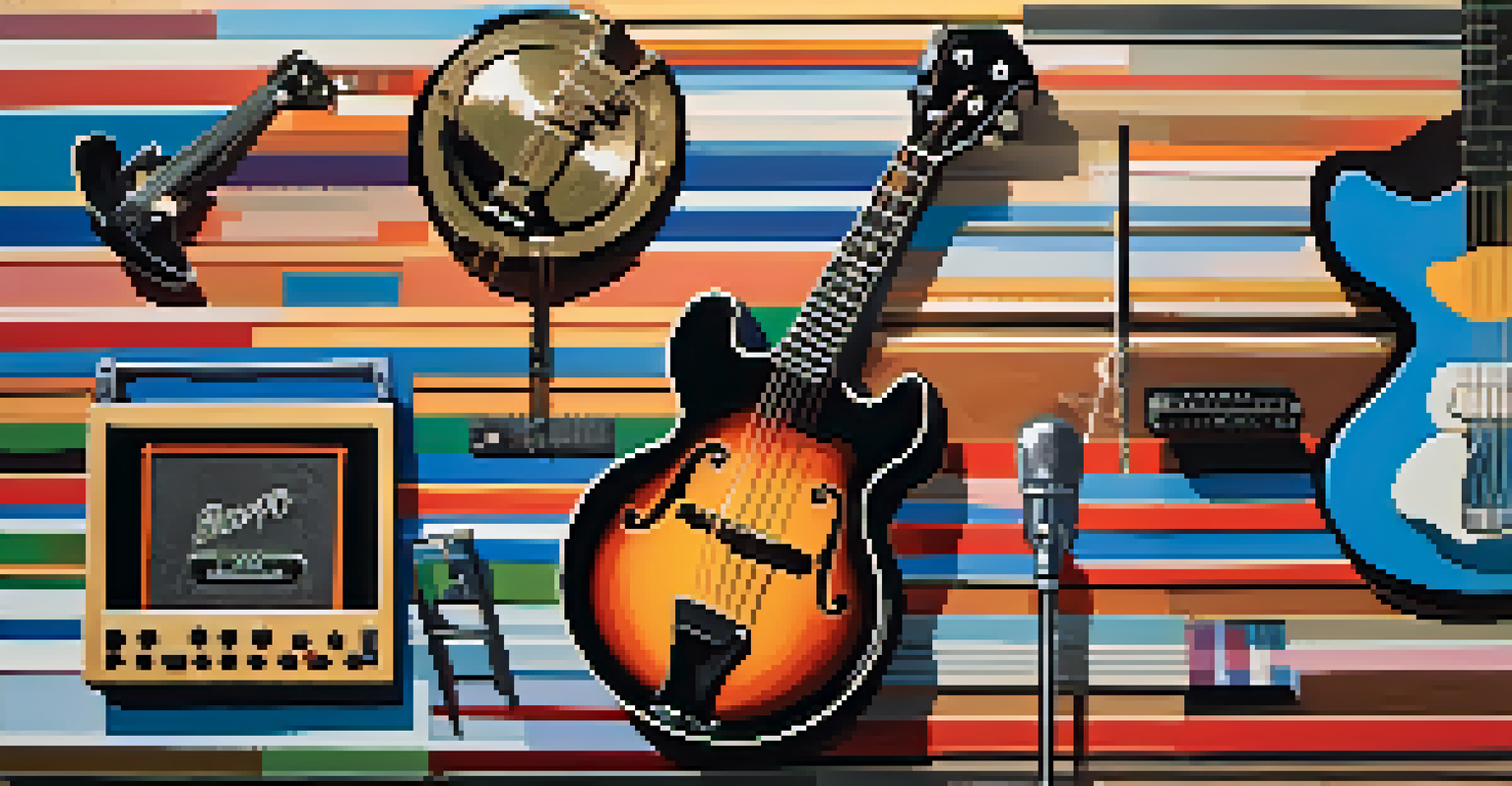The Influence of Genre on Songwriting: Adapting Your Style

Understanding the Basics of Musical Genre
Musical genres are like different flavors of ice cream, each with its unique taste and appeal. They encompass specific styles, themes, and structures that can greatly influence how a song is written. For example, a country song often tells a story, while pop songs may focus more on catchy hooks and melodies. Understanding these nuances helps songwriters tailor their approach according to the genre they're working in.
Music is the shorthand of emotion.
Genres aren't just labels; they’re a framework that guides the songwriting process. When you choose a genre, you're also selecting a set of expectations that your audience has. This means that familiarizing yourself with the conventions of your chosen genre can lead to more effective songwriting. Just like a painter chooses colors to evoke emotions, songwriters select genres to connect with their listeners.
Ultimately, understanding musical genres allows songwriters to navigate the creative landscape more effectively. Knowing what works within a genre can save time and enhance creativity, leading to more polished and engaging songs. By embracing this framework, songwriters can also push boundaries and innovate within their chosen styles.
How Genre Shapes Song Structure and Lyrics
Different genres come with their own structural templates that can guide songwriters. For instance, a typical pop song often follows a verse-chorus-verse format, while rock songs might favor longer instrumental sections. Understanding these structures can help you craft your songs more effectively, ensuring they resonate with the intended audience.

Lyrics also vary significantly across genres. Hip-hop lyrics may focus on rhythm and wordplay, while folk songs often emphasize storytelling and emotional depth. By recognizing these differences, songwriters can adapt their lyric-writing techniques to fit the genre's expectations, enhancing the overall impact of their music.
Understanding Genre's Impact
Musical genres shape songwriting by influencing structure, lyrical content, and emotional tone.
Moreover, the emotional tone of lyrics can be influenced by genre. A heavy metal song might convey angst and rebellion, while a jazz piece might evoke feelings of nostalgia and romance. By aligning the lyrical content with the genre's prevalent themes, songwriters can create a more cohesive and compelling narrative.
The Role of Instrumentation in Different Genres
Instrumentation is like the seasoning in a dish; it can elevate a song from ordinary to extraordinary. Each genre has its signature instruments that contribute to its distinctive sound. For example, a bluegrass song typically features banjos and fiddles, while electronic music relies heavily on synthesizers and drum machines.
Genre is a label we use to classify music, but the best music often transcends these boundaries.
When adapting your songwriting style, considering instrumentation can greatly influence the mood and feel of your song. If you're writing a ballad, you might choose soft acoustic guitars, while a dance track would benefit from punchy beats and vibrant synths. The right instrumentation not only complements your lyrics but also enhances the overall listening experience.
Experimenting with different instruments can also inspire creativity. If you're used to writing with a guitar, trying out a piano or even a digital audio workstation (DAW) might open new avenues for your songwriting. Embracing the unique sounds of various genres can help you develop a signature style that sets you apart in the music industry.
Cultural Influence on Genre and Songwriting
Every genre is steeped in cultural history that shapes its themes and styles. For instance, reggae music emerged from the struggles of Jamaican communities, often addressing social issues and resistance. Understanding the cultural context of a genre can enrich your songwriting by adding layers of meaning and authenticity.
When you write within a specific genre, you’re not just creating music; you're also participating in a cultural conversation. This can be an opportunity to express your own experiences and perspectives while honoring the genre's roots. By weaving personal narratives into the fabric of a genre, you can create songs that resonate deeply with listeners.
Cultural Context Enriches Music
The cultural history behind genres adds depth and authenticity to songwriting, allowing for personal narratives.
Furthermore, blending elements from different cultures can lead to innovative songwriting. Genres like fusion or world music thrive on the intersection of diverse influences, creating fresh sounds that attract a wider audience. Exploring these cultural dimensions can inspire you to break away from conventions and craft something truly unique.
Adapting Your Style: Blending Genres
In today’s music landscape, genre boundaries are more fluid than ever, allowing for creative experimentation. Blending genres can lead to exciting new sounds and attract diverse audiences. For instance, artists like Lil Nas X have successfully merged country and hip-hop, creating a unique style that resonates with various listeners.
When blending genres, it’s essential to maintain a sense of cohesion in your songwriting. This means understanding the core elements of each genre you wish to incorporate and finding a way to unify them. For example, combining the storytelling aspect of folk with the upbeat nature of pop can create catchy yet meaningful songs.
Don’t be afraid to break the rules! Some of the best music comes from artists who dare to experiment and redefine what a genre can be. By embracing a hybrid approach, you can carve out your own niche in the music industry and appeal to a broader audience.
Embracing Your Unique Voice Within Genres
While genres provide a framework, your unique voice is what makes your music stand out. It's important to remember that each songwriter brings their own perspective and experiences to the table. Even within the confines of a specific genre, your individuality can shine through, making your songs more relatable and impactful.
Finding your voice might involve experimenting with different styles and themes until you discover what resonates with you. This could mean writing lyrics that reflect your personal experiences or choosing instrumentation that aligns with your emotional expression. Embracing this authenticity is crucial in creating music that feels genuine.
Embrace Your Unique Voice
While genres provide a framework, infusing your personal style is essential for creating relatable and impactful music.
Ultimately, the intersection of genre and personal style can lead to powerful songwriting. By blending your unique voice with the conventions of a genre, you can create music that not only honors its roots but also pushes boundaries. This balance is key to developing a signature sound that captivates listeners.
Learning from Genre Masters: Inspiration for Songwriters
One of the best ways to adapt your style is by studying the masters of each genre. Legendary artists like Bob Dylan in folk or Madonna in pop have laid the groundwork for countless songwriters. By analyzing their songwriting techniques and understanding how they navigated their genres, you can glean valuable insights to inform your own work.
Listening closely to how these artists structure their songs, craft their lyrics, and choose their instrumentation can serve as a practical guide. For instance, notice how a blues artist conveys emotion through specific chord progressions or how a hip-hop artist uses rhythm and rhyme. These elements can inspire you to incorporate new techniques into your songwriting toolkit.

Additionally, attending live performances and workshops can provide firsthand experience of the genre you wish to explore. Engaging with other musicians and hearing their perspectives can spark creativity and encourage collaboration. By immersing yourself in the genre, you can deepen your understanding and refine your songwriting skills.